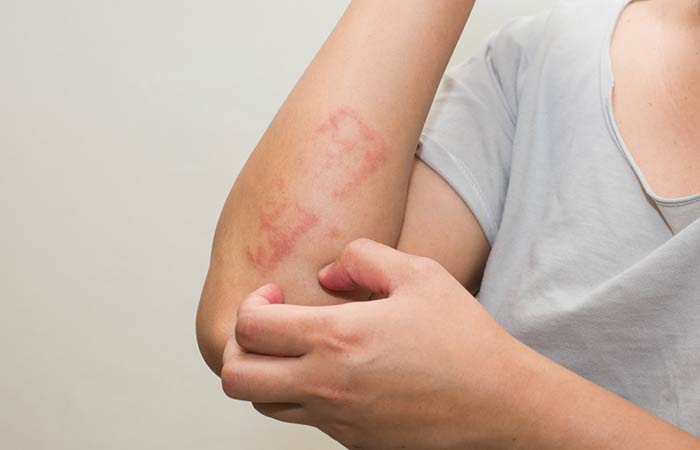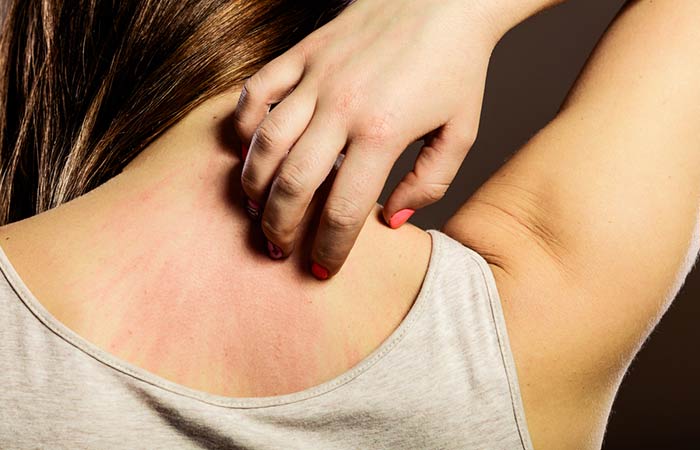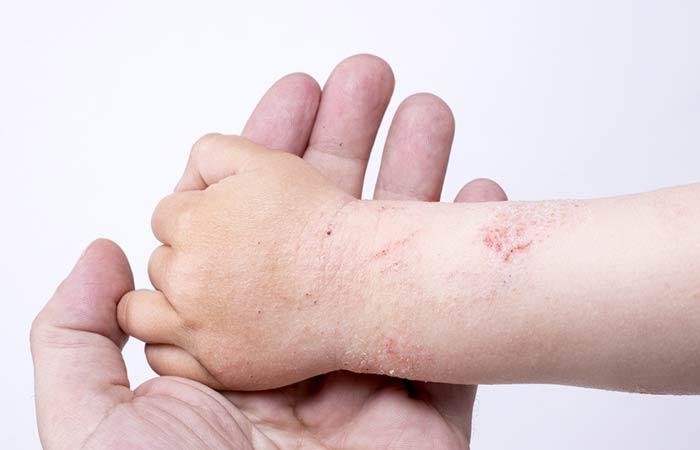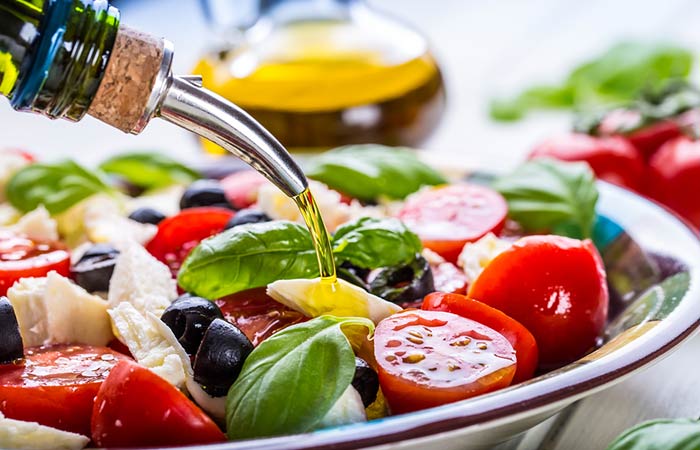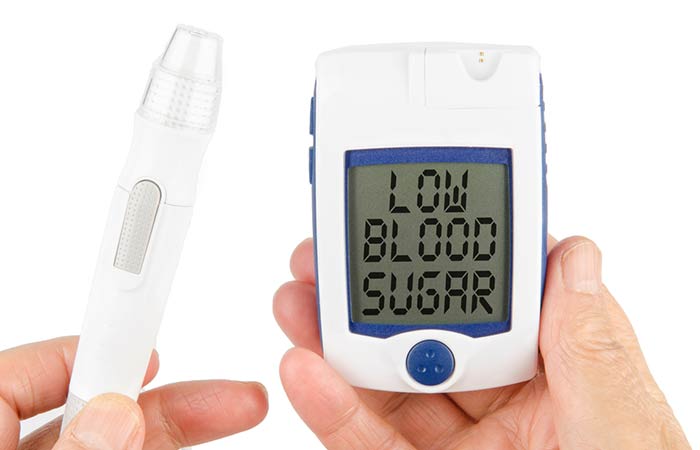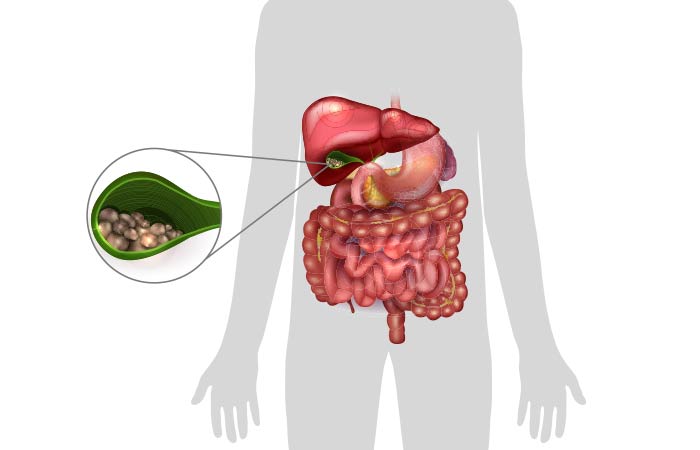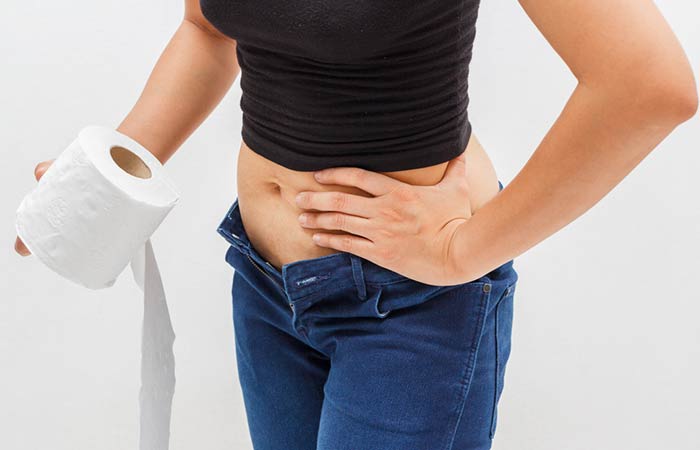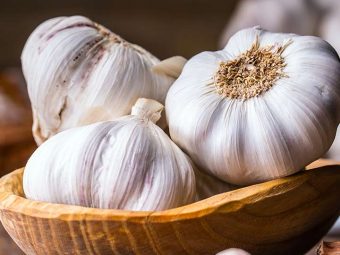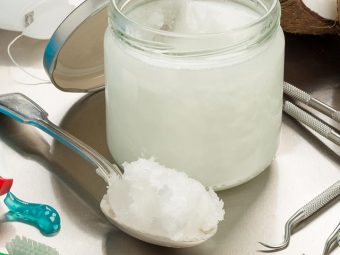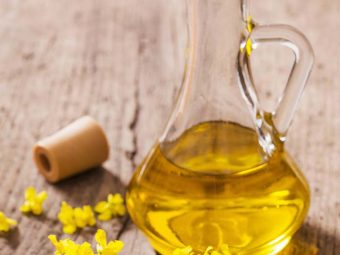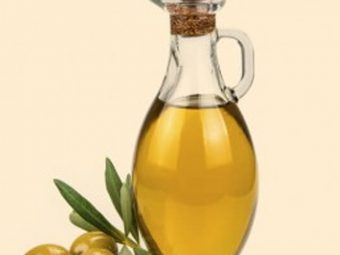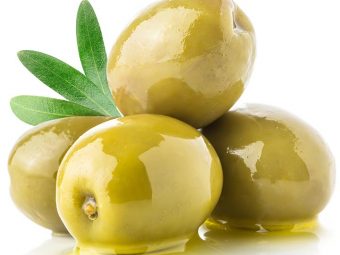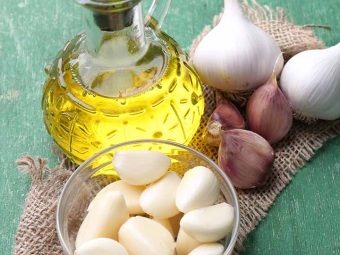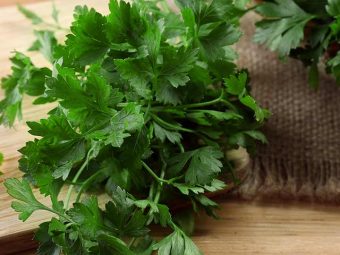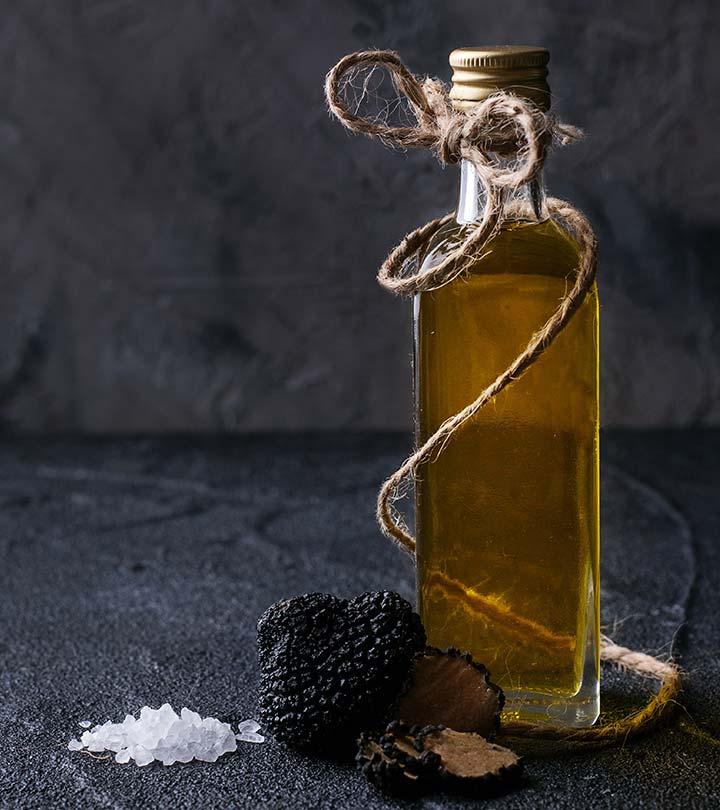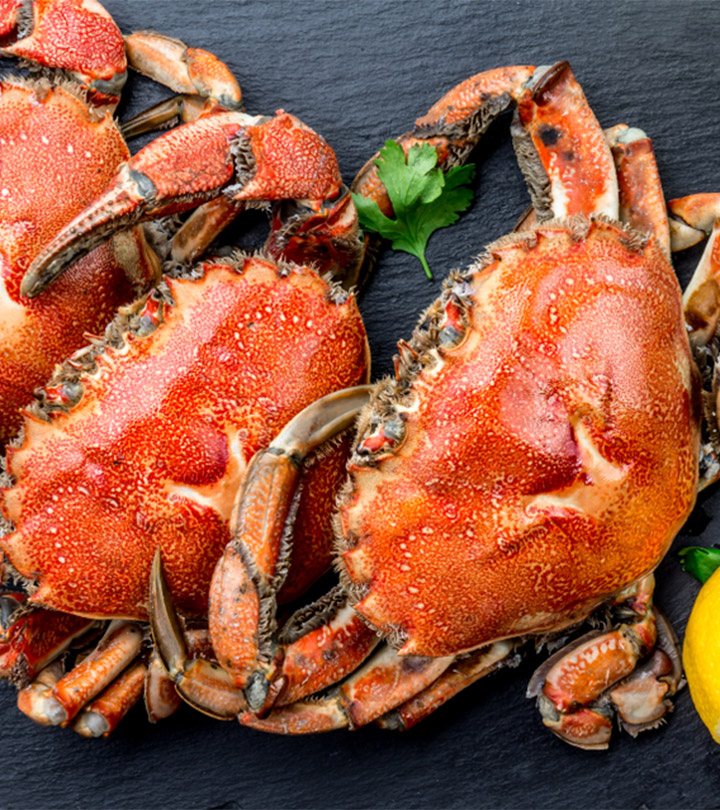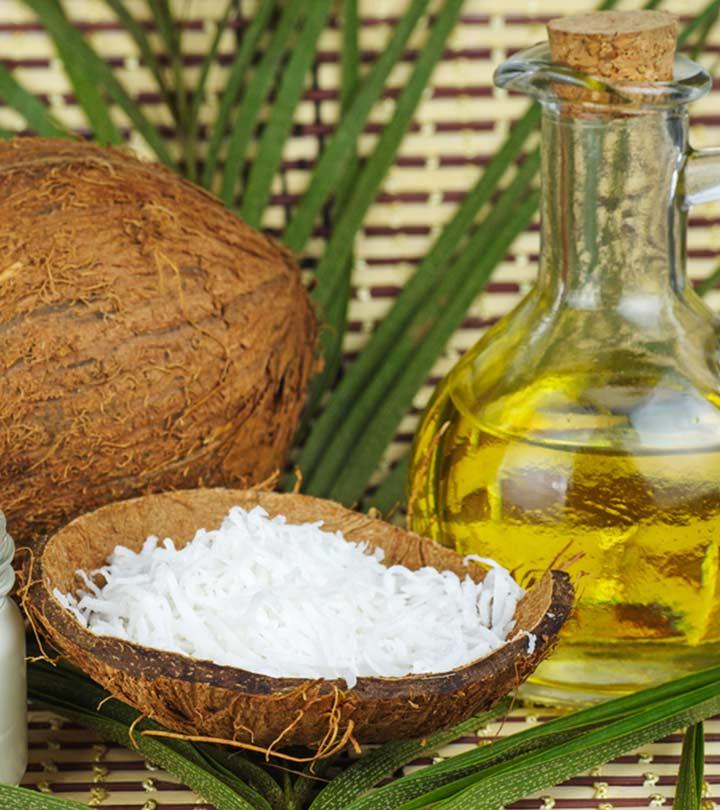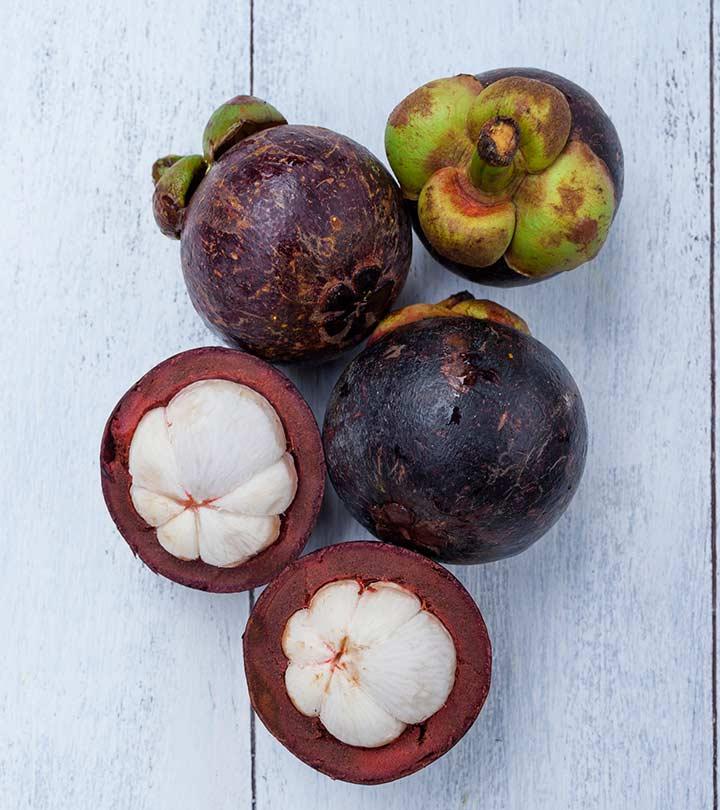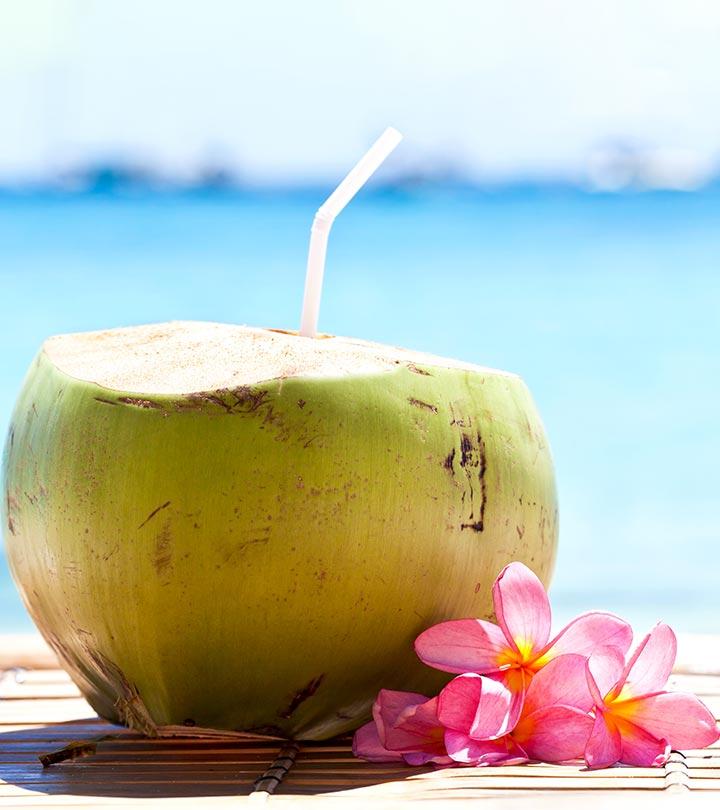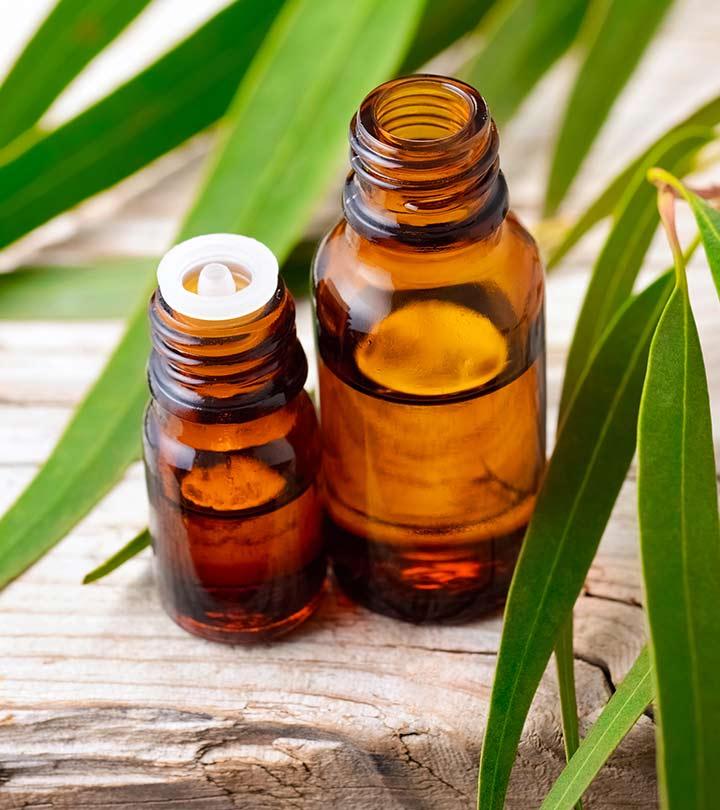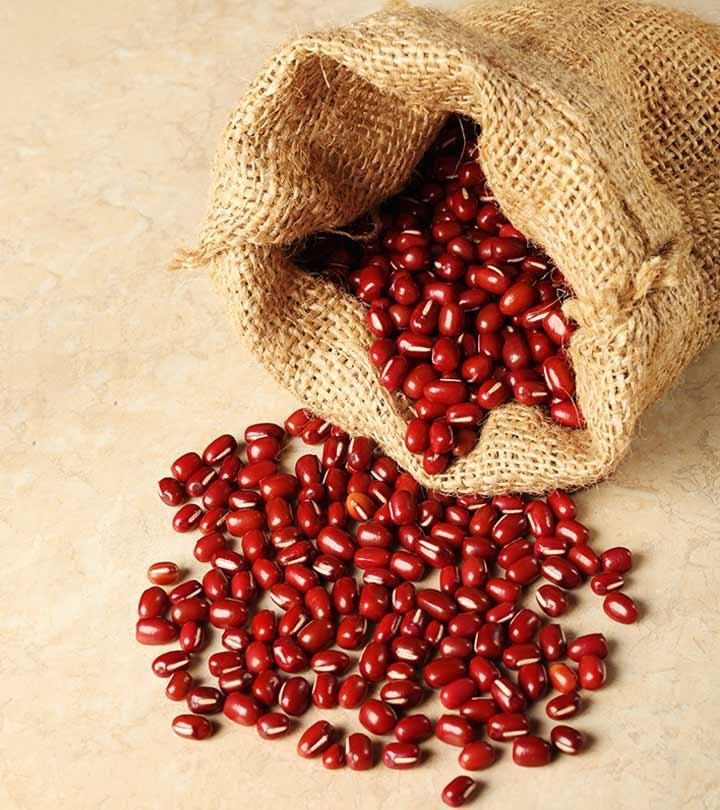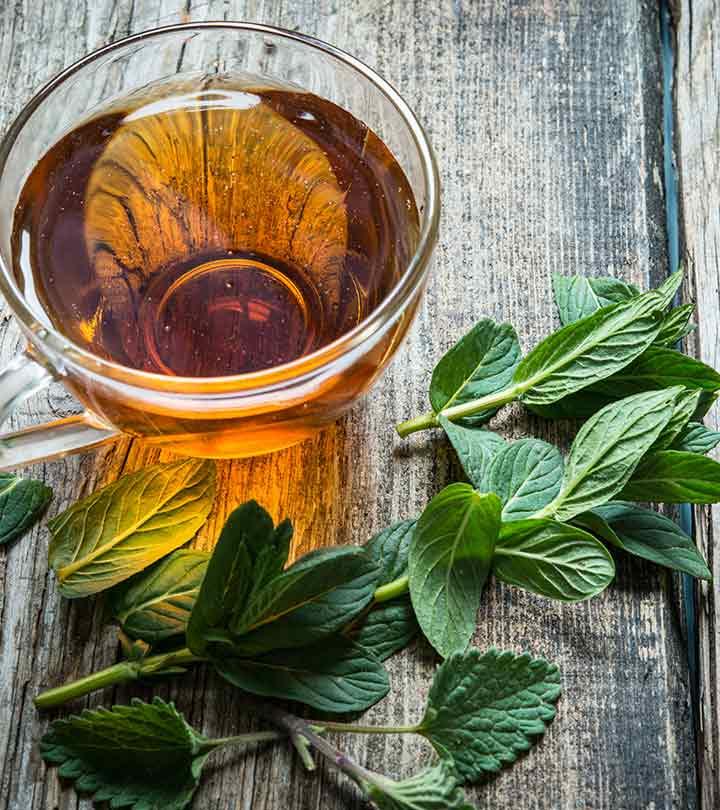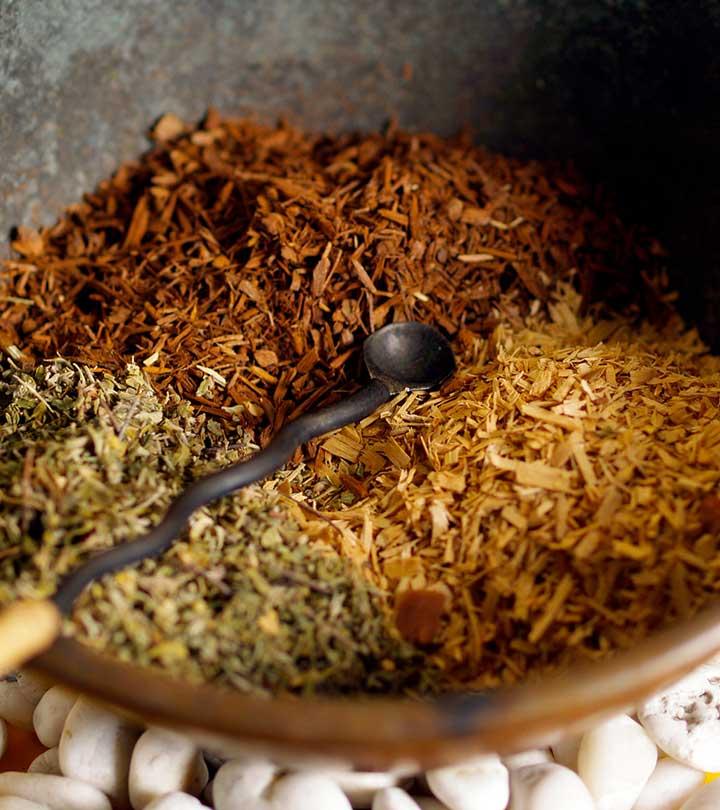14 Serious Side Effects Of Olive Oil You Should Know About
Who knew consuming this popular oil may not be as healthy as we thought?
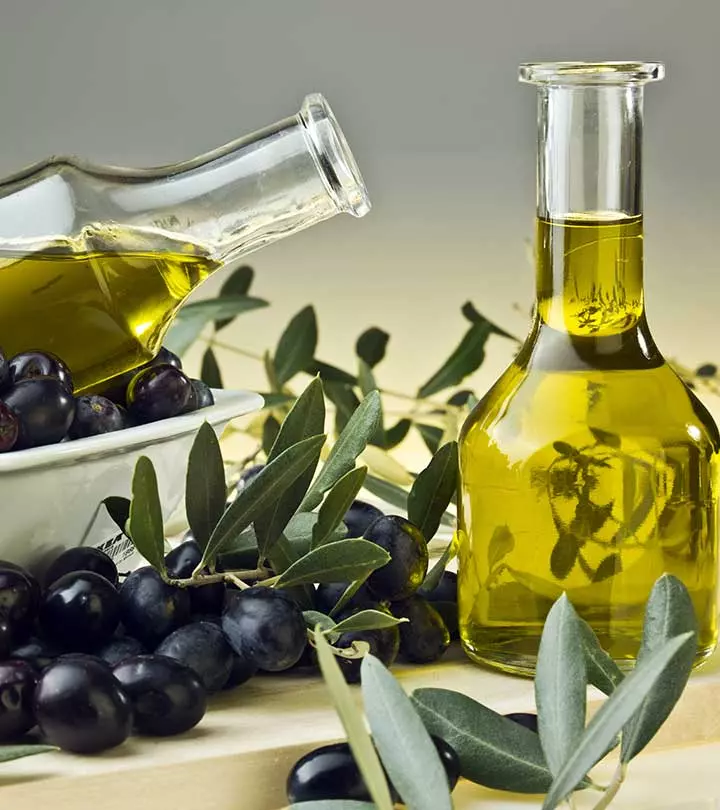
Image: Shutterstock
There are two sides to every coin.
This famous adage implies that there’s both a good and bad side to every ingredient. Olive oil is no exception. Touted to be one of the best in the food and skincare world, this oil has numerous health and beauty benefits to offer.
Excessive use of oilve oil can harm your skin and increase the chances of acne.
Olive oil is heavy. It does not quickly absorb into your skin, and creates a thick layer on the skin, clogging the pores. Jesse Feder, Clinical Dietitian at the Memorial Regional Hospital South, says, “Olive oil contains vitamin E, antioxidants, and healthy fats that can protect, moisturize, and make your skin look younger/healthier. However, too much of it can cause clogging of pores and potential breakouts. Hence, it is best to apply only a thin layer to the skin.”
Is olive oil bad for you, then? Well, only if you frequently apply it to your skin and it turns into an adhesive surface that traps dirt, dust, and sebum into it. This process paves the way for the appearance of unwanted acne and pimples.
So, we recommend you not to go overboard with the application of olive oil on your skin—twice a week should be enough to get a complexion that’s smooth and hydrated.
Note: If you have oily skin, it’s better for you to avoid olive oil altogether due to its naturally sticky and oily nature.
2. Can Cause Allergies
Several people show acute allergic reactions to olive oil. And if you are one of them, I would suggest you stay away from it—this oil will only aggravate your condition.
Olive oil can cause severe allergies, such as contact dermatitisi XAn allergic condition in which the skin develops rashes after coming in contact with an irritant or allergen. , eczemai XA chronic skin condition that causes dryness, irritation, blisters, inflammation, and red rashes on the skin. , respiratory allergies, and so on. It is mainly experienced during or after the topical application of the oil. Those who are prone to allergies can also face this issue after they consume something that has olive oil as one of the ingredients in their food. It’s always better to know olive oil benefits and side effects before consuming it regularly.
Glenda Chung Hinchey, a lifestyle blogger, documented her olive oil allergy in her blog. She said, “If I so much as consume a tablespoon of the stuff, I have to run to the bathroom for unpleasant business (i).” She also mentions a friend who experiences vomiting as a reaction to olive oil.
Note: If you notice any symptoms mentioned here, consult your physician immediately. Remember, prevention is better than cure. And you wouldn’t want your condition to aggravate.
3. Causes Skin Rashes
As explained earlier, people with oily skin should avoid olive oil altogether.
Oily skin is the result of an uncontrolled sebum secretion. When olive oil combines with your naturally greasy skin, it can cause skin irritation, rashes, and redness on your skin.
4. Not Safe On A Baby’s Skin
Babies have the most sensitive skin, and using olive oil on them can be a bit risky. It can cause rashes, redness and irritation on the skin.
This is because, especially with the newborns, we are yet to know whether the baby is allergic to this oil or not. And seriously, why take chances when you can have other safe options, like coconut oil, to massage your little angel?
Note: Yet, if you are keen on using olive oil, always use a good quality extra virgin olive oil for your baby’s skin.
5. Is Not Suitable For Dry Skin
Is olive oil good for you if you have dry skin? Olive oil is not a good option for those with extremely dry skin too. Many studies have concluded that oleic acid present in olive oil is responsible for breaking the skin’s natural moisturizing abilities in case of dry skin.
6. Can Cause Blackheads
With its extremely sticky and oily nature, olive oil can pave the way for the growth of blackheads on your face.
As explained earlier, the greasy olive oil forms a layer on your skin that traps in the dirt and dead skin into it. This, in turn, makes way for the formation of blackheads.
7. Saturated Fat-Related Diseases
Olive oil is a rich source of monounsaturated fati XHealthy fat with one unsaturated carbon bond in the molecule abundantly found in olive oil, nuts, fish, and seeds. . Every tablespoon of this oil contains about 14% saturated fat and 120 calories.
This is a huge amount—almost three times higher than that of a 4 oz chicken breast. Regular consumption of unprocessed olive oil can lead to weight gain and also increase the risks of lethal diseases like atherosclerosisi XA health condition in which the arteries become narrow and hard due to the build-up of cholesterol plaques in the walls of them. , obesity, heart attack, stroke, breast cancer, and colon cancer (1).
8. Trans-Fat Related Diseases
Olive oil is often refined or partially hydrogenated under high heat and pressure. This process alters its molecular structure and burns the healthy omega-3 fatty acid contained in the olives.
It also affects the cholesterol levels in our bloodstream by decreasing ‘good cholesterol’ and increasing the ‘bad’ one. This, in the long run, raises the danger of cardiovascular diseases (2).
9. Lowers Blood Sugar
This oil can lower your blood sugar below the normal level. Olive oil makes way for an increased insulin resistance; that is the main reason for its activity against blood sugar levels. Over consumption can make you prone to several health complications, like hypoglycemiai XA condition where the blood sugar level is lower than normal, caused due to underlying health issues and diabetes treatment. , sweating, trembling, weakness, etc.
10. Lowers Blood Pressure
Olive oil is known to keep our heart healthy. But, studies have found that over-consumption of olive oil can cause a massive fall in blood pressure. So if you suffer from high blood pressure, it might be good for your heart but if not it can be detrimental. The overall health will become vulnerable to many problems like dizziness, lightheadedness, stroke, and kidney failure (3).
However, there is extremely limited research on olive consumption leading to liver damage or kidney stones.
11. Causes Inflammation
Loaded with fat, olive oil increases the chances of developing inflammation in our body.
It contains a high amount of oleic acid (about 78%) which plays a vital role in releasing the lipopolysaccharidesi XMainly derived from gut microbiomes, they are the main components of the outer membrane of gram-negative bacteria. (LPS)), appended to the large fat-rich lipoprotein particles called chylomicrons, from the gut into the bloodstream. The more the LPS present in the blood, greater the extent of inflammation caused by the immune cells.
Additionally, olive oil also promotes higher levels of markers, like inflammatory cytokines, that are linked to chronic inflammation (4).
12. Gallbladder Stones/Blockage
Gallbladder problems are one of the serious side effects of olive. You should stay away from consuming too much olive oil as it may block the gallbladder or cause painful gallstones. Our liver produces bile, which is accumulated inside the gallbladder. But, when our body holds excess fat, and we include olive oil in our daily diet, this stored bile starts to secrete and emulsify the fats. It ultimately results in stones or blockage.
13. Can Cause Diarrhea
The high-fat content of olive oil may cause digestive disorders, leading to upset stomach, pains and gastrointestinal problems like diarrhea.
We all know the strong laxative properties of olive oil. So when we consume it in large amounts, our system becomes unable to digest it completely. As a result, we develop minor to moderate diarrhea (5).
14. High On Calories
Unnecessary weight gain is one of the major side effects of too much olive oil consumption.
Olive oil, just like all other oils and fats, are a chief source of calories. You will be surprised to know that every 16 oz of olive oil contains calories that are equal to your two days of calorie requirement (4,000 per pound); far more than even refined sugar (1,725 calories per pound).
 Trivia
TriviaThis is why you should never cook your whole course meal in olive oil. Drizzling on top of your meals, of course, is a safer option.
In This Article
Infographic: Side Effects Of Olive Oil On Your Hair
Now you know all about the side effects olive oil may cause on your body and skin. But what about your hair? Can olive oil damage your tresses or scalp? In certain cases, yes it can. Check out the infographic below to learn more about the damage olive oil can do to your hair. For example, did you know that olive oil may not suit particular hair types? Keep reading to know more. Illustration: StyleCraze Design Team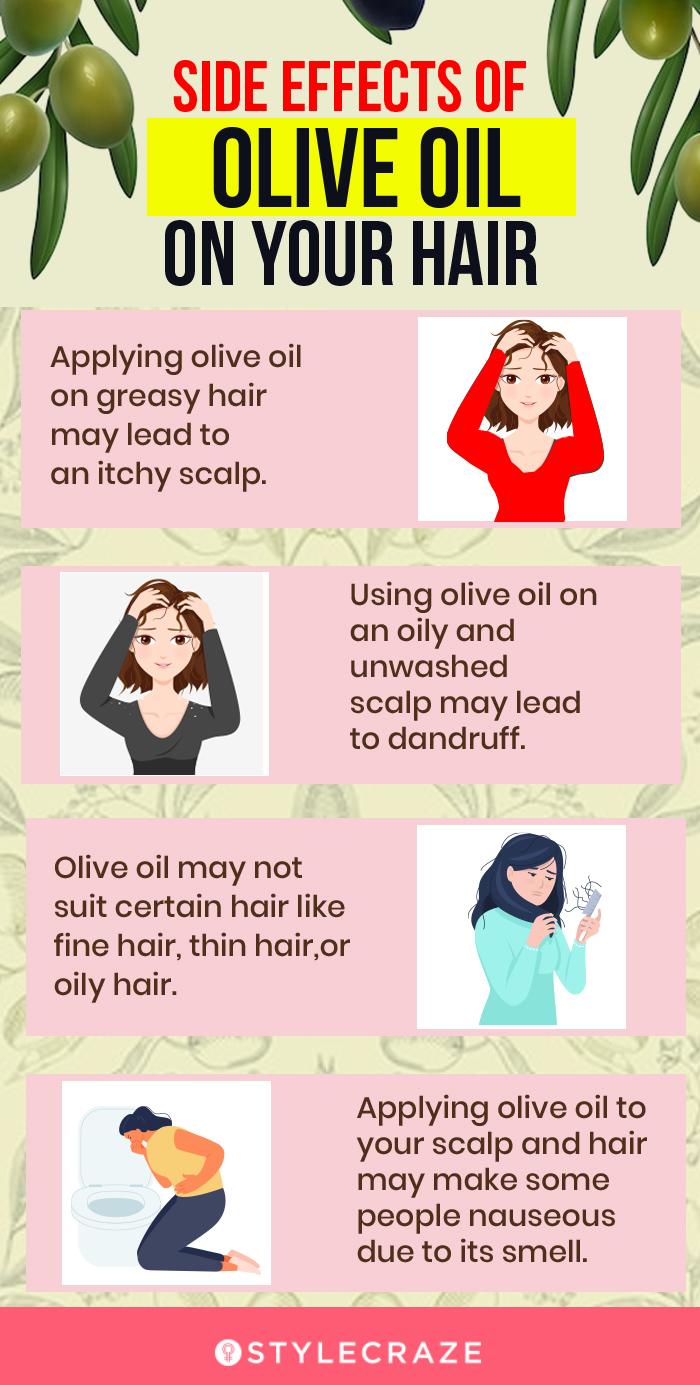
Olive oil is a natural oil with excellent health-promoting properties. The monounsaturated fats in olive oil offer several health benefits. However, excess consumption of olive oil may cause several side effects. It may cause acne, allergies, skin rashes, blackheads, and saturated- and trans-fat-related diseases. It may also cause diarrhea and inflammation in some people. Hence, consume it in moderation to avoid its adverse reactions. Consult your doctor in case of emergencies.
Frequently Asked Questions
What are the side effects of putting olive oil directly in the eye?
Eva De Angelis, Dietitian Nutritionist with a bachelor’s degree in Nutrition and Dietetics from ISalud University, says, “There are no side effects of using olive oil directly in our eyes. In fact, extra-virgin olive oil can be a great addition to your treatment for dry eyes.”
Can there be any long-term side effects to drinking olive oil shots to gain weight?
Jesse Feder says, “Olive contains a significant amount of healthy fats. This makes it high in calories. If you were to drink olive oil shots consistently, this would more than likely contribute to weight gain. However, even though olive oil has healthy fats, too many of them can still lead to negative health outcomes. These include excessive weight gain, high triglycerides, and fatty stool.”
Is it ok to take olive oil every day?
Yes, it is okay to take olive oil every day as long as you consume it in moderation and do not use it to prepare main course meals.
Is a spoonful of olive oil a day good for you?
Yes, a spoonful of olive oil every day can help you get the benefits of this oil.
Can olive oil make you throw up?
In rare cases, olive oil may cause nausea, headache from the smell ,or vomiting as some individuals may find it difficult to digest or have adverse reactions.
Is extra virgin olive oil bad for your heart?
No. On the contrary, extra virgin olive oil may improve heart health. However, you need to consume it in moderation and avoid cooking with it under high heat or pressure.
What is the healthiest olive oil?
Extra virgin olive oil is the healthiest type of olive oil as it is minimally processed, extracted using natural methods, and held to high purity standards.
Does olive oil cause blood thinning?
Anecdotal evidence suggests that consuming olive oil may slow down blood clotting and increase your chances of bleeding and bruising. However, there is no scientific evidence suggesting this to be true.
Key Takeaways
- Olive oil may cause skin allergies and acne in some people with excess use.
- It may interfere with some medications like blood thinners and reduce their effectiveness.
- The high-calorie content of this oil may lead to weight gain and affect blood glucose levels.
- In addition, it may cause gastrointestinal problems and abdominal discomfort in some individuals.
Delve into the wonders of olive oil in this informative video below. Uncover its remarkable benefits, versatile uses, potential side effects, and witness how this natural oil can positively impact your overall health and well-being. Click below now and let the exploration begin!
Personal Experience: Source
StyleCraze's articles are interwoven with authentic personal narratives that provide depth and resonance to our content. Below are the sources of the personal accounts referenced in this article.
i. Allergic to olive oilhttps://gigihawaii.wordpress.com/2009/10/06/allergic-to-olive-oil/
Latest Articles
-

33 Wonderful Benefits Of Banana For Skin, Hair, And Health
Americans consume 13.4 lbs of bananas on average per year, and here's why!
-

9 Amazing Benefits Of Kombucha Tea, Nutrition, & Side Effects
This refreshing tea is loaded with probiotics and works magic to invigorate your health.
-

Is Truffle Oil Really Healthy? 8 Significant Benefits + Preparation Tips
This gourmet ingredient can have multiple beneficial effects on your overall health.
-

5 Health Benefits Of Crab, Nutrition, And Popular Recipes
These hard-shelled crustaceans not only taste good but help improve overall health, too.
-

Coconut Oil Vs. Olive Oil: Which Oil Is Healthier?
While both are healthy, understand why olive oil has the edge over coconut oil in the end.
-

8 Health Benefits Of Mangosteen, Nutrition, And How To Eat It
From weight loss to controlling debates, learn what else this fruit can help you with.
-

Is Drinking Coconut Water Safe For Diabetics?
You will be amazed to know how beneficial this drink is, especially for people with diabetes.
-

10 Top Benefits Of Almond Butter, Nutrition, And Recipes
Learn why you should switch to this nutrient-dense nut butter and how it benefits your health.
-

11 Health Benefits Of Eucalyptus Oil And How To Use It
Address multiple health issues with this oil's analgesic and anti-inflammatory properties.
-

All About Adzuki Beans – Benefits + Recipes
These fibrous beans are your best bet if you want to switch to a healthy diet.
-

13 Health Benefits Of Peppermint Tea And How To Make It
Add this refreshing drink to your daily routine, and your body will thank you for it!
-

What Is Yohimbe And Should You Use It?
Yohimbe is a popular ingredient in performance boosters, but it is not without its risks.




